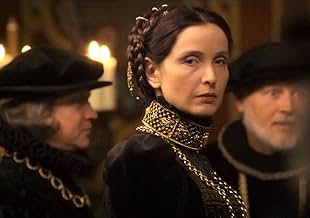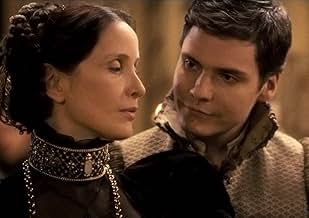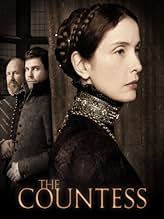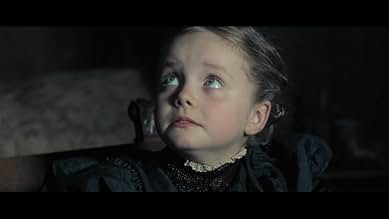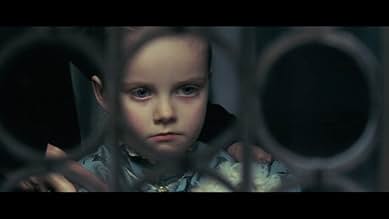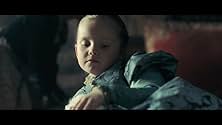IMDb-BEWERTUNG
6,2/10
8866
IHRE BEWERTUNG
Eine ungarische Gräfin aus dem 17. Jahrhundert begibt sich auf ein mörderisches Unterfangen, in der Überzeugung, dass das Baden im Blut von Jungfrauen ihre Schönheit bewahren wird.Eine ungarische Gräfin aus dem 17. Jahrhundert begibt sich auf ein mörderisches Unterfangen, in der Überzeugung, dass das Baden im Blut von Jungfrauen ihre Schönheit bewahren wird.Eine ungarische Gräfin aus dem 17. Jahrhundert begibt sich auf ein mörderisches Unterfangen, in der Überzeugung, dass das Baden im Blut von Jungfrauen ihre Schönheit bewahren wird.
- Auszeichnungen
- 1 Gewinn & 1 Nominierung insgesamt
Andy Gätjen
- Miklos
- (as Andy Gatjen)
Empfohlene Bewertungen
Writer/director/producer/musical scorer/actress Julie Delpy brings to the screen a character from history that few know. The film is based on the true history of the woman known as The Blood Countess, but after viewing this film it is obvious that the actual figure on whom the story is based was a brilliant political mind, a woman of noble breeding who could read and write in four languages, who once widowed was able to successfully defend her lands from the warring Turks and exact control over the reigning Hungarian King Matthias. But back to the history of the character as written by Delpy. 'Countess Elizabeth Báthory de Ecsed (Báthory Erzsébet in Hungarian) (1560 - 1614) was a countess from the renowned Báthory family of Hungarian nobility. She is considered the most prolific female serial killer in history and possibly the most prolific of any gender. She and four collaborators were accused of torturing and killing hundreds of girls, with one witness attributing to them over 650 victims, though the number for which they were convicted was 80. Erzsébet herself was neither tried nor convicted. In 1610, however, she was imprisoned in the Csejte Castle, where she remained bricked in a set of rooms until her death four years later. Later writings about the case have led to legendary accounts of the Countess bathing in the blood of virgins in order to retain her youth.'
The film opens with voice over by István Thurzó (Daniel Brühl) who relates the story of his only love. We are privy to the strange behaviors of the young Erzsébet who had a sadistic streak and was at birth promised to be the bride of Ferenc Nádasdy (Charly Hübner). She became a beautiful woman and Erzsébet (Julie Delpy) married General Nádasdy, gave birth to children, and together they were the power couple of Hungary. When Nádasdy dies, Erzsébet meets and falls passionately in love with István Thurzó (Daniel Brühl), a many 19 years her junior, but Istvan's father György Thurzó (William Hurt) prevents Istvan from remaining with Erzsébet. Left alone Erzsébet remains a powerful warrior, dallies with the sadomasochistic Dominic Vizakna (Sebastian Blomberg), but fears her young lover will forget her if she ages. She discovers that the blood from virgins will restore her youth and thus begins the serial killings to support her vanity. As questions of debts owed to her by the King there is an investigation of her personal history led by György Thurzó and without proper trial she is condemned to house arrest in darkened sealed rooms in her own Csejte Castle where her fate is sealed.
The film is beautifully designed, costumed, photographed and scored, and Delpy manages to pace her story credibly and well. For this viewer there is an absence of gritty passion that would make the history more indelible: Delpy and the remainder of the cast fail to create fiery on-screen chemistry that would have brought a sense of stronger impetus to the heinous acts that occur. But as a piece of rarely known history it is a fascinating film about a strong woman of the past and the impact she had on her country ... and on legends!
Grady Harp
The film opens with voice over by István Thurzó (Daniel Brühl) who relates the story of his only love. We are privy to the strange behaviors of the young Erzsébet who had a sadistic streak and was at birth promised to be the bride of Ferenc Nádasdy (Charly Hübner). She became a beautiful woman and Erzsébet (Julie Delpy) married General Nádasdy, gave birth to children, and together they were the power couple of Hungary. When Nádasdy dies, Erzsébet meets and falls passionately in love with István Thurzó (Daniel Brühl), a many 19 years her junior, but Istvan's father György Thurzó (William Hurt) prevents Istvan from remaining with Erzsébet. Left alone Erzsébet remains a powerful warrior, dallies with the sadomasochistic Dominic Vizakna (Sebastian Blomberg), but fears her young lover will forget her if she ages. She discovers that the blood from virgins will restore her youth and thus begins the serial killings to support her vanity. As questions of debts owed to her by the King there is an investigation of her personal history led by György Thurzó and without proper trial she is condemned to house arrest in darkened sealed rooms in her own Csejte Castle where her fate is sealed.
The film is beautifully designed, costumed, photographed and scored, and Delpy manages to pace her story credibly and well. For this viewer there is an absence of gritty passion that would make the history more indelible: Delpy and the remainder of the cast fail to create fiery on-screen chemistry that would have brought a sense of stronger impetus to the heinous acts that occur. But as a piece of rarely known history it is a fascinating film about a strong woman of the past and the impact she had on her country ... and on legends!
Grady Harp
Well, actually, in the Little Carpathians, apparently, which are not part of Transylvania, or so Wikipedia tells me.
I really enjoyed this film (at home on pay-per-view)though I think it is intended for a pretty narrow audience. As others have noted, the dialogue is amazingly stilted (very literary, rather like a French novel of the 17th or 18th century) and delivered in near-monotone. I kept feeling that the whole movie had been dubbed into English. On the other hand, I found the acting very fine, and I admired the insistence on presenting these characters as not at all like you, me, or the folks in the latest TV drama. The Countess in particular is a strange, unique portrait--her piety, her desire for amorous adventure, her pride, her intelligence. And that's before you get to the blood-of-virgins part.
The film proposes that what we are seeing before our eyes is not the truth about the Countess. We are watching a fantasy of a noblewoman enacting a tale "told by the victors"--by the men who were enriched by her downfall and relieved, too, to be rid of the very possibility of an intelligent woman. The tale is told, too, by the peasants and others whose sons are fighting in her army. Yet the man who questions the gory story is her lover, and he too may be deceived. There is no simple answer to the question, what really happened?--no resolution.
In short, it's an intellectual (and visual) treat, but it won't affect your blood sugar.
I really enjoyed this film (at home on pay-per-view)though I think it is intended for a pretty narrow audience. As others have noted, the dialogue is amazingly stilted (very literary, rather like a French novel of the 17th or 18th century) and delivered in near-monotone. I kept feeling that the whole movie had been dubbed into English. On the other hand, I found the acting very fine, and I admired the insistence on presenting these characters as not at all like you, me, or the folks in the latest TV drama. The Countess in particular is a strange, unique portrait--her piety, her desire for amorous adventure, her pride, her intelligence. And that's before you get to the blood-of-virgins part.
The film proposes that what we are seeing before our eyes is not the truth about the Countess. We are watching a fantasy of a noblewoman enacting a tale "told by the victors"--by the men who were enriched by her downfall and relieved, too, to be rid of the very possibility of an intelligent woman. The tale is told, too, by the peasants and others whose sons are fighting in her army. Yet the man who questions the gory story is her lover, and he too may be deceived. There is no simple answer to the question, what really happened?--no resolution.
In short, it's an intellectual (and visual) treat, but it won't affect your blood sugar.
I must admit that I had expected a bit more from this movie, especially given the story that it was portraying and telling. I just had expected something grander than what director Julie Delphy dished out here.
Everyone should be fairly familiar with the bloody story of Countess Bathory, well at least if you have just an ounce of interesting in World history. So I am not going to delve into details about the storyline.
What worked for this movie was the acting. Julie Delphy, who both directed and starred in the movie, did a great job in her portrayal of the Countess Erzebet Bathory. There was something very raw and emotional about her acting in "The Countess" and she really carried the movie all by herself.
Julie Delphy seems rather talented, doing acting, directing, producing and even writing the music for this 2009 movie.
But the movie was just too slow paced for my liking, but it was an interesting portrayal of the infamous Countess Erzebet Bathory.
Everyone should be fairly familiar with the bloody story of Countess Bathory, well at least if you have just an ounce of interesting in World history. So I am not going to delve into details about the storyline.
What worked for this movie was the acting. Julie Delphy, who both directed and starred in the movie, did a great job in her portrayal of the Countess Erzebet Bathory. There was something very raw and emotional about her acting in "The Countess" and she really carried the movie all by herself.
Julie Delphy seems rather talented, doing acting, directing, producing and even writing the music for this 2009 movie.
But the movie was just too slow paced for my liking, but it was an interesting portrayal of the infamous Countess Erzebet Bathory.
This movie rocks because it manages to be both a lavish, complex period movie and a psychological horror movie at the same time. Julie Delpy does a fantastic job in the role of a complex woman from a brutal period in European history, and her performance somehow gracefully manages to be both sympathetic and monstrous. Bathory is one of history's most prolific and sadistic mass murderers, but historians are ultimately unsure of who she really was, and to what extent she was responsible for the atrocities for which she is credited. Most agree that the whole "beauty treatment bloodbath" thing is a myth made up by later generations to spice up the story, so I was surprised that a telling supposedly rooted in fact ended up going that route, but I loved the idea of a Bathory who is a real person and not just a 2-dimensional fiend. Great sets, costumes, and performances from a well-written script make The Countess an engaging and informative portrait of a woman whose vanity and blood lust have become the stuff of legend.
I really wanted to like this. Based on the true story of 17th century Countess Bathory, who grew obsessed with retaining her youth, and decided the best way to do this was by bathing in the blood of virgins. What could have been a disturbing descent into madness turns out to be a dull by the numbers bio-pic/period piece.
Julie Delpy does an alright job in the titular role, but the departure from her usual romantic roles doesn't really work, as Delpy just seems like she's on auto-pilot throughout most of the film. The script, written by Delpy, treats the Countess as some sort of feminist pioneer, and at other times, shows her to be a monster. The movie wants to have it both ways, but in the end it it just seems really confused and tiresome.
Julie Delpy does an alright job in the titular role, but the departure from her usual romantic roles doesn't really work, as Delpy just seems like she's on auto-pilot throughout most of the film. The script, written by Delpy, treats the Countess as some sort of feminist pioneer, and at other times, shows her to be a monster. The movie wants to have it both ways, but in the end it it just seems really confused and tiresome.
Wusstest du schon
- WissenswertesProduction on the film was delayed numerous times. It was initially expected to start filming in 2005, then in summer 2007, followed by October 2007, before finally starting in February 2008. This led to three initially cast actors having to drop out, first Ethan Hawke as Gyorgy Thurzo and later Radha Mitchell as Anna Darvulia and Vincent Gallo as Dominic Vizakna.
- PatzerAt about 1h15m, the fifth book on the shelf is the "Dictionnaire De Boyer". Abel Boyer did write a French-English dictionary, but he was born in 1664 and Countess Báthory died in 1614.
- Zitate
Gyorgy Thurzo: Love is a myth, to keep the minds of young peasants and virgins occupied with a dream.
- VerbindungenVersion of Der Vampir von Notre Dame (1957)
- SoundtracksCouranta VI
Solinger Streichquartett
Written by Isaak Pesch
From the album "Telemusik"
© & ® Peter Lamprecht
Courtesy of Solinger Streichquartett/Peter Lamprecht
Top-Auswahl
Melde dich zum Bewerten an und greife auf die Watchlist für personalisierte Empfehlungen zu.
- How long is The Countess?Powered by Alexa
Details
- Erscheinungsdatum
- Herkunftsländer
- Offizielle Standorte
- Sprachen
- Auch bekannt als
- The Countess
- Drehorte
- Burg Kriebstein, Kriebstein, Saxony, Deutschland(exteriors: Countess Bathory's castle)
- Produktionsfirmen
- Weitere beteiligte Unternehmen bei IMDbPro anzeigen
Box Office
- Budget
- 5.700.000 € (geschätzt)
- Weltweiter Bruttoertrag
- 784.522 $
- Laufzeit1 Stunde 38 Minuten
- Farbe
- Sound-Mix
- Seitenverhältnis
- 2.35 : 1
Zu dieser Seite beitragen
Bearbeitung vorschlagen oder fehlenden Inhalt hinzufügen

